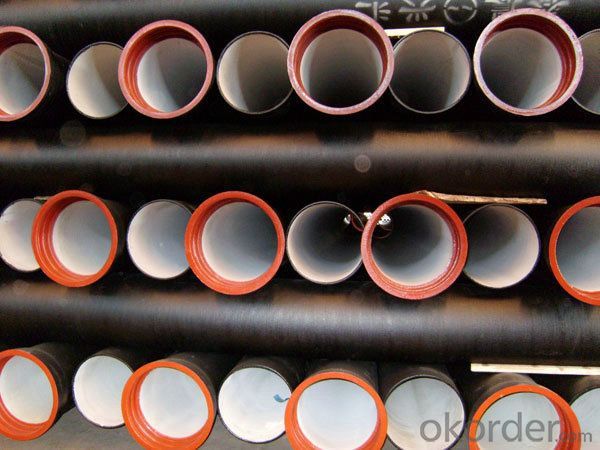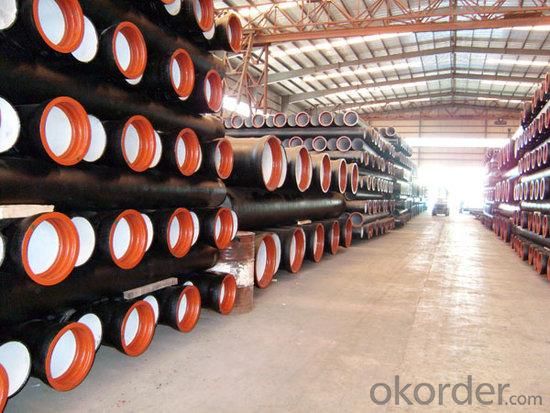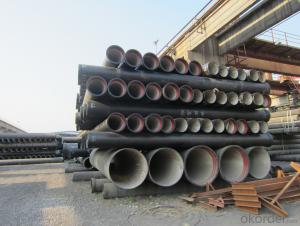Ductile Iron Pipe of China DN400 EN545/EN598/ISO2531 for Water Supply
- Loading Port:
- China main port
- Payment Terms:
- TT or LC
- Min Order Qty:
- 20 m.t.
- Supply Capability:
- 100000 m.t./month
OKorder Service Pledge
OKorder Financial Service
You Might Also Like
1,Ductile Iron Pipe Description :
1) Pipes confirm to ISO2531,K9 class,T type joint,6m long,with inside cements lining conform to ISO4179, outside Zinc spraying(130g/m2) and bitumen coating(70μm) conform to ISO8179.
2) Pipe ends: Spigot and socket ends, with 100% SBR rubber gaskets accoding to ISO4633
3) we can do third party inspection according to customer's request.
4) Our products have been sold to many international market, such as Middle East and South East Asia and Africa.
2,Main Features of the Ductile Iron Pipe:
•High yield strength
•High tensile Strength
•High corrosion resistance
•Pressure Resistence
•Anti-corrosion
•Installation is convenient
•Satisfy the highest hygienic standards
1. Material: Ductile iron grade 500-7/ 450-10 in accordance with ISO1083
2. Standard: ISO 2531, EN545, EN598, ANSI, AWWA
3. Certificate: ISO9001, ISO14001, SGS, NSF, WRAS
4. Test: In accordance with ISO 2531 / EN 545 / EN598 and 100% water pressure test
5. Length: 6m or cut into 5.6m, 5.7m, 5.8m
6. Internal Lining: Cement, conform to ISO4179
7. External coating: Zinc + Bitumen, conform to ISO8179
3,Ductile Iron Pipe Images:


4. Ductile Iron Pipe Specification
Place of Origin: China (Mainland)
Model Number: DN80-1600
Length: 6M/5.7M/NEGOTIATED
Standard: ISO2531 / EN545
Application: Potable/Sewage Water
Diameter: DN80-1600
Shape: Round
Hardness: 230
Pipe Wall Thickness: standerd
Pull Strength: 420
Yield (≥ MPa): 300
Material: Ductile Iron
water ductile iron pipe: SO2531 / EN545 DI pipe
5.FAQ:
We have organized several common questions for our clients,may help you sincerely:
1.Q: Why would you choose ductile iron pipe rather than other pipe materials?
A:The reasons are obvious for that not only ductile iron pipe possesses the inherent strength and flexibility of ductile iron, combined with proven corrosion protection systems, but also the cost savings can be achieved from design to installation and commissioning.
2.Q:Why can you guarantee the inner of pipes can’t be corroded?
A: High alumina cement mortar lining and sulphate-resistant cement mortar lining. These two special linings are applicable to inner anti-corrosion for sewage pipes, improving resistance to erosion of the sewage components.
- Q:How does ductile iron pipe compare to PVC pipe in terms of performance and cost?
- Ductile iron pipe and PVC pipe have different characteristics in terms of performance and cost. Ductile iron pipe is known for its strength, durability, and ability to withstand high pressure and heavy loads, making it ideal for applications that require robust performance such as water distribution systems. On the other hand, PVC pipe is lightweight, corrosion-resistant, and more flexible, making it suitable for above-ground and non-pressurized applications like drainage systems. In terms of cost, PVC pipe is generally less expensive than ductile iron pipe, especially for smaller diameter pipes. However, as the diameter increases, ductile iron pipe becomes more cost-effective due to its superior strength and longer lifespan, which reduces maintenance and replacement costs over time. Ultimately, the choice between ductile iron and PVC pipe depends on the specific application, budget, and desired performance characteristics.
- Q:Are ductile iron pipes suitable for installation in areas with high soil compaction?
- Indeed, areas with high soil compaction can accommodate the installation of ductile iron pipes. Renowned for their robustness and longevity, ductile iron pipes exhibit remarkable resistance against external loads and pressures. Their inherent pliability enables them to endure the strains caused by intense soil compaction. Furthermore, ductile iron pipes possess a substantial modulus of elasticity, enabling them to retain their form and structural soundness even when subjected to substantial burdens. Consequently, they present themselves as an exceptional option for regions with high soil compaction, as they adeptly manage the force and deliver dependable and enduring functionality.
- Q:The difference between spheroidal graphite cast iron pipe and HDPE water supply pipe
- (4) HDPE pipes do not need corrosion protection. If the water supply pipeline is made of ductile iron pipe, the inner and outer walls of the ductile iron pipe shall be treated with corrosion protection.(5) the normal service life of the ductile iron pipe is 20~25 years after the pipe is treated by inner and outer walls. The HDPE tube has no corrosion, and the normal service life is 50 years.
- Q:Are ductile iron pipes suitable for wastewater treatment plants?
- Yes, ductile iron pipes are suitable for wastewater treatment plants. Ductile iron pipes are known for their durability, strength, and resistance to corrosion, making them ideal for handling the harsh and corrosive environment found in wastewater treatment plants. Additionally, they have a smooth internal surface, reducing the risk of clogging and facilitating the efficient flow of wastewater.
- Q:Are ductile iron pipes suitable for railway crossings?
- Railway crossings can indeed utilize ductile iron pipes. Ductile iron, a robust and long-lasting material, finds extensive use in numerous applications, which include water and sewage systems. Its exceptional tensile strength and flexibility allow it to withstand heavy loads and vibrations, both of which are commonly encountered in the vicinity of railway crossings. Moreover, ductile iron pipes exhibit exceptional resistance to corrosion, making them particularly valuable in areas prone to moisture and exposure to diverse weather conditions. This resistance guarantees the pipes' durability, ultimately reducing the need for maintenance and replacement, thus cutting costs. Furthermore, ductile iron pipes are renowned for their effortless installation and versatility. They seamlessly integrate with other pipe types and fittings, facilitating their incorporation into the overall railway crossing infrastructure. However, it is important to bear in mind that the suitability of ductile iron pipes for railway crossings hinges on various factors, such as load requirements, soil conditions, and specific project specifications. Consulting engineering professionals and adhering to industry standards and regulations is vital to ensure the appropriate selection and installation of ductile iron pipes for railway crossings.
- Q:How are ductile iron pipes protected against internal corrosion?
- Ductile iron pipes are protected against internal corrosion through a process called cement mortar lining. This involves applying a layer of cement mortar to the inner surface of the pipe, creating a protective barrier between the iron and the water flowing through it. This lining helps to prevent the formation of rust, corrosion, and scale build-up, ensuring the longevity and durability of the pipes.
- Q:What is the expected joint restraint method for ductile iron pipes?
- The expected joint restraint method for ductile iron pipes is typically mechanical joint restraints, such as gland and follower glands or wedge-action restraints, which provide a secure and reliable connection while allowing for expansion and contraction of the pipes.
- Q:DN1800 can the length of ductile iron pipes be several meters? What is the total weight?
- Ductile cast iron pipe after annealing, the microstructure is ferrite and pearlite, good mechanical properties, excellent corrosion resistance, good ductility, good sealing effect, simple installation, mainly for municipal, industrial and mining enterprises, water supply, gas, oil etc..
- Q:What is the relationship between the direction of the spigot and the direction of the flow in the ductile iron pipe?
- The utility model is mainly used for conveying water, and is an ideal choice for tap water pipes.
- Q:What is the difference between a PE fire hose and a ductile iron pipe?
- Galvanized steel pipe: divided into cold galvanized steel pipe, hot galvanized steel pipe, cold galvanized steel pipe has been banned, and the latter is also advocated by the state for the time being. In 60s and 70s, developed countries began to develop new types of pipes, and galvanized pipes were banned. China's Ministry of construction and other four ministries also issued a civilization, indeed from two, 000 years since the galvanized pipe as a water supply pipe, the New District cold water pipe has rarely used galvanized pipe, and some of the hot water pipe is galvanized pipe. Hot dip galvanized steel pipe is widely used in fire, power and highway.
1. Manufacturer Overview |
|
|---|---|
| Location | |
| Year Established | |
| Annual Output Value | |
| Main Markets | |
| Company Certifications | |
2. Manufacturer Certificates |
|
|---|---|
| a) Certification Name | |
| Range | |
| Reference | |
| Validity Period | |
3. Manufacturer Capability |
|
|---|---|
| a)Trade Capacity | |
| Nearest Port | |
| Export Percentage | |
| No.of Employees in Trade Department | |
| Language Spoken: | |
| b)Factory Information | |
| Factory Size: | |
| No. of Production Lines | |
| Contract Manufacturing | |
| Product Price Range | |
Send your message to us
Ductile Iron Pipe of China DN400 EN545/EN598/ISO2531 for Water Supply
- Loading Port:
- China main port
- Payment Terms:
- TT or LC
- Min Order Qty:
- 20 m.t.
- Supply Capability:
- 100000 m.t./month
OKorder Service Pledge
OKorder Financial Service
Similar products
New products
Hot products
Related keywords



























